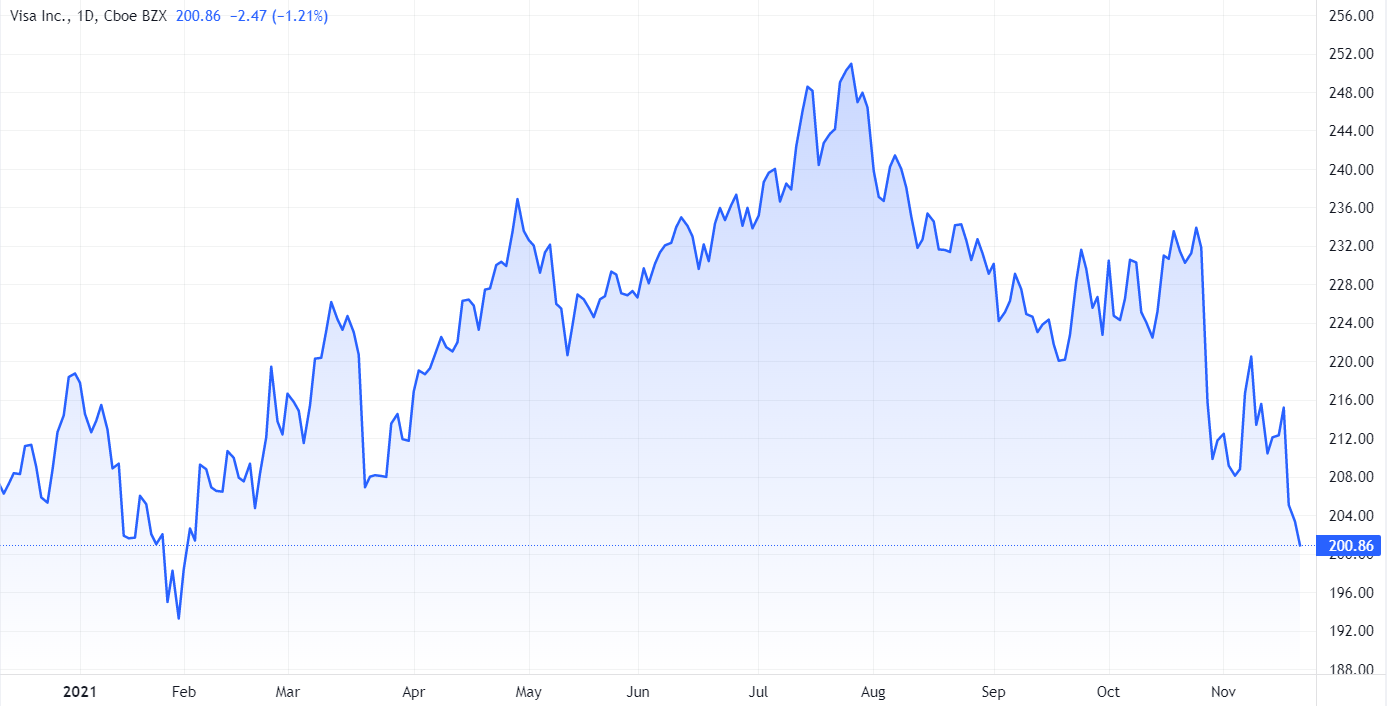💳 Will Visa Learn Its Lesson From Amazon?
Moderna gets FDA boost; Foot Locker slides.
Hey Global Investor! Here's what you need to know before the US markets open.
Market Snapshot 📈
S&P 500 (Friday's Close) 4,697.96 -6.58 (0.14%)
NASDAQ (Friday's Close) 16,057.44 +63.73 (0.40%)
FTSE 100 (5 PM IST) 7,247.08 +23.62 (0.33%)
NIFTY 50 (Today's Close) 17,416.55 -348.25 (1.96%)
USDINR (Today's Close) 74.37 (1 Year -0.86%)
🔥 Top Movers
KRNT +13.80%
AKYA +13.37%
MAXN +13.06%
ENTA -18.63%
VNET -14.56%
FTVH -13.88%
💳 Visa: Lessons From Amazon?
Visa (V) is known for its relatively high transaction cost. Amazon couldn't get Visa to reduce the charge, so it took another route to dissuade customers from using Visa cards on its platform. It started levying a surcharge on Visa transactions to make it more expensive for customers. Will that strategy succeed? (Tweet This)
Freely Charging Fees!
A co-branded credit card results from a mutual partnership between the credit card issuer (Visa/MasterCard etc.) and the merchant (or a bank). The credit card carries the merchant's logo and provides merchant-specific benefits to customers.
These co-branded cards are major money-spinners for card issuers. Amazon's co-branded Visa credit card was the fastest-growing of the 10-largest co-branded credit cards in 2019. The tiff with Amazon has its roots in a deal Visa pulled off in 2015 with Costco.
Back then, American Express was the credit card partner for Costco. Visa wanted in, and to win the deal, it offered Costco a break on the fees it usually charges. It won the deal, but that didn't make any of its banking partners happy since they were still saddled with the fees from Visa.
Following this fiasco, Visa promised its banking partners that it would not look to pull off any such stunts in the future. So what's Visa's business model?
Visa (and MasterCard) sets rates that merchants pay whenever a person swipes their credit card with them (these fees are called interchange fees). For some "preferred" banks and merchants, Visa discounts the interchange fees to get more volume over its network. It earmarked a sum of $8.4B for such incentives in fiscal 2021, a jump of 26% year-on-year.
So what kind of pricing power does Visa have? Take Brexit, for instance. The EU had a cap on the interchange fees that Visa could charge the merchants. After Brexit, such a restriction did not apply in the UK. So Visa promptly increased the interchange fee, in some cases, a five-fold increase to 1.5% for online credit card payments. For debit card transactions, the fee was hiked to 1.15% from 0.2%.
Visa's Kodak Moment?
Amazon had enough of what it considered an unnecessary burden from Visa. It told customers that starting January 19th, 2021, it will no longer accept Visa credit cards issued in the UK. Amazon made it a point to highlight that better technology should generally reduce costs, but that with Visa, they either remain high or even increase!
Amazon is now giving incentives to customers to not use their Visa cards. It is offering GBP 20 to Prime customers to switch from their default Visa to an alternative payment method. And it's throwing in GBP 10 for non-Prime customers.
Quite naturally, Visa was disappointed and termed Amazon's tactic as "threatening to restrict consumer choice in the future." This move marks further deterioration in the relationship between the two companies.
Back in September, Amazon had imposed a 0.5% surcharge on customers' Visa purchases in Singapore and Australia, so they self-select away from the "higher cost" option.
This is not Visa's first brush with a major company over its charges. Walmart's unit in Canada stopped accepting Visa credit cards in 2016 after an agreement could not be reached on fees. The matter took seven months to settle after 20 stores stopped accepting Visa cards.
So how are Visa and its brethren positioned? Precariously it would seem. Given that Buy Now, Pay Later (BNPL) is becoming more prevalent, and Amazon has partnered with BNPL firm Affirm to start providing those services to its customers, there's a distinct possibility that Visa will become Amazon's persona non grata in the near future.
It seems this is Visa's Kodak moment. If it remains obstinately oblivious to the changing environment and rests on the laurels of its merchant network, Visa will have started its inexorable slide to oblivion. Just as the photo film company didn't think digital cameras would ever pose a threat to its business. We all know how that turned out!
Market Reaction
V ended at $200.86, down 1.17%. Shares are down 6% over the last five trading sessions.
Company Snapshot 📈
V $200.86 -2.38 (1.17%)
Analyst Ratings (37 Analysts) BUY 86% HOLD 11% SELL 3%
Newsworthy 📰
Approval: FDA clears Moderna and Pfizer's Covid vaccine booster shots for all adults (MRNA +4.92%)
Bearish: Deutsche Bank says sell Robinhood because meme stock phenomenon caused street to overestimate growth (HOOD -5.04%)
Earnings: Foot Locker stock slides after Q3 earnings beat, muted holiday forecast (FL -11.95%)
Later Today 🕒
Zoom Video Communications Earnings (ZM)
Agilent Technologies Inc. Earnings (A)
Keysight Technologies Inc. Earnings (KEYS)
Arrowhead Pharmaceuticals Inc. Earnings (ARWR)
Cerence Inc. Earnings (CRNC)
Urban Outfitters Inc. Earnings (URBN)
Central Garden & Pet Co. Earnings (CENT)
Paragon 28 Inc. Earnings (FNA)
Today's Market Terminology: Net Debt To EBITDA
The net debt-to-EBITDA ratio is a debt ratio which shows how many years will it take for a company to pay back its debt if net debt and EBITDA are held constant
You can start investing in US stocks with platforms like Winvesta. Get an account in as little as 15 minutes and start building your global portfolio today. *Capital is at risk.





